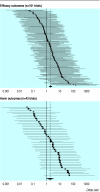Identifying outcome reporting bias in randomised trials on PubMed: review of publications and survey of authors
- PMID: 15681569
- PMCID: PMC555875
- DOI: 10.1136/bmj.38356.424606.8F
Identifying outcome reporting bias in randomised trials on PubMed: review of publications and survey of authors
Abstract
Objective: To examine the extent and nature of outcome reporting bias in a broad cohort of published randomised trials.
Design: Retrospective review of publications and follow up survey of authors. Cohort All journal articles of randomised trials indexed in PubMed whose primary publication appeared in December 2000.
Main outcome measures: Prevalence of incompletely reported outcomes per trial; reasons for not reporting outcomes; association between completeness of reporting and statistical significance.
Results: 519 trials with 553 publications and 10,557 outcomes were identified. Survey responders (response rate 69%) provided information on unreported outcomes but were often unreliable--for 32% of those who denied the existence of such outcomes there was evidence to the contrary in their publications. On average, over 20% of the outcomes measured in a parallel group trial were incompletely reported. Within a trial, such outcomes had a higher odds of being statistically non-significant compared with fully reported outcomes (odds ratio 2.0 (95% confidence interval 1.6 to 2.7) for efficacy outcomes; 1.9 (1.1 to 3.5) for harm outcomes). The most commonly reported reasons for omitting efficacy outcomes included space constraints, lack of clinical importance, and lack of statistical significance.
Conclusions: Incomplete reporting of outcomes within published articles of randomised trials is common and is associated with statistical non-significance. The medical literature therefore represents a selective and biased subset of study outcomes, and trial protocols should be made publicly available.
Figures



References
-
- Hahn S, Williamson PR, Hutton JL. Investigation of within-study selective reporting in clinical research: follow-up of applications submitted to a local research ethics committee. J Eval Clin Pract 2002;8: 353-9. - PubMed
-
- Tannock IF. False-positive results in clinical trials: multiple significance tests and the problem of unreported comparisons. J Natl Cancer Inst 1996;88: 206-7. - PubMed
-
- Streiner DL, Joffe R. The adequacy of reporting randomized, controlled trials in the evaluation of antidepressants. Can J Psychiatry 1998;43: 1026-30. - PubMed
-
- Chan AW, Hróbjartsson A, Haahr MT, Gøtzsche PC, Altman DG. Empirical evidence for selective reporting of outcomes in randomized trials: comparison of protocols to published articles. JAMA 2004;291: 2457-65. - PubMed
Publication types
MeSH terms
LinkOut - more resources
Full Text Sources
